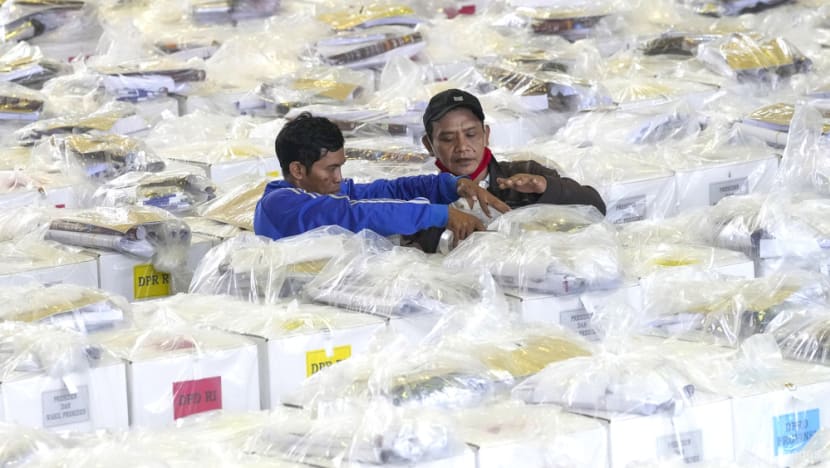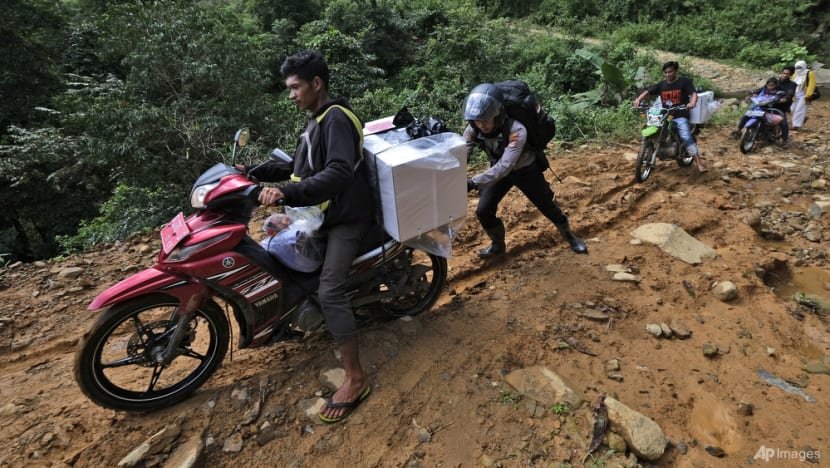Over 100 Indonesian election workers die in 2024 polls; observers call for change of single-day format
A total of 114 Indonesian poll workers have died and over 15,000 have fallen ill since Feb 14, in the wake of the world’s largest single-day elections.


This audio is generated by an AI tool.
JAKARTA: At 6am on Feb 14, election worker Fahmi clocked in at his assigned polling station in Bogor, West Java.
Little did he know the shift would last 26 hours, until 8am the following day.
“Other poll workers had finished by dawn (on Feb 15), but I had to continue uploading data,” said Mr Fahmi, who goes by one name. A paid volunteer of the Election Organising Team (KPPS), he was in charge of voting operations, vote counting, and entering data into the vote tabulation app.
“Everyone was pressed for time to recap the counts, including during breaks – especially now that there are so many legislative candidates,” he told CNA.
Instead of going home to sleep after that, the 39-year-old headed off to his day job as a programmer.
Mr Fahmi had a “very sore” back from his marathon shift, but polling day exertions proved fatal for other election workers.
A total of 114 workers have died and over 15,000 have fallen ill since Feb 14, when Indonesia held its presidential and legislative elections, which have been dubbed the world’s largest in a single day.
While the number of deaths this year is a stark drop from nearly 900 in 2019 – the first time Indonesia held presidential and legislative elections on the same day – election and democracy watchers have called for further changes to reduce the toll on workers.
This year, more than 5.7 million election workers served at over 820,000 polling stations across the sprawling archipelago, which had 204.8 million eligible voters.
On top of complex logistics, some parts of the country saw bad weather on polling day. Floods hit parts of Java, for instance, causing voting to be postponed or delayed. Some photos showed officials working in shin-deep waters.
A “SYSTEMIC PROBLEM”
The deaths and illnesses are a “systemic problem”, said Mr Heroik Pratama, a researcher at the Association for Elections and Democracy (Perludem), a non-governmental organisation. This is due to the single-day format of the elections, resulting in a high workload for poll workers, he said.
The single-day format, also called the five-ballot election, stems from a 2013 constitutional court decision to synchronise the presidential and legislative elections, Mr Heroik explained.
Besides voting for their president on Feb 14, Indonesians also voted for 580 members of the House of Representatives and 152 members of the Regional Representative Council, which together form the parliament. About 9,900 candidates contested for seats in the House of Representatives.
At the same time, Indonesians voted for their legislators at the provincial, regency and city levels. About 250,000 candidates contested for about 20,000 seats.
NO PAUSE TO AVOID SUSPICION
Before 2019, the presidential and legislative elections were held separately, Mr Heroik said.
After the first single-day elections that year, Gadjah Mada University conducted a study that showed KPPS members working an average of 20 to 22 hours on polling day, he said.
There is no pause in the voting and counting process to avoid suspicion and allegations of fraud, Mr Heroik explained. “This resulted in a high workload, so (workers) were exhausted and fell ill.”
The lower death toll this year is due to changes made since 2019, Indonesia’s health ministry said. “We conducted an evaluation that resulted in the death rate being reduced by more than 70 per cent, compared to the previous election,” ministry spokesperson Siti Nadia Tarmizi said.
This year, the government capped the age of election workers at 55 and conducted health screening for them. According to news outlet Jakarta Post, a reason for 2019’s death toll was the number of elderly poll workers and those who had pre-existing health issues.
Health Minister Budi Gunadi Sadikin acknowledged that there is more room for improvement, such as in health screening, the Jakarta Post reported.
Mr Fahmi and another KPPS officer, Mr Andri Maulana, said they were given vitamins to fortify themselves for polling day. But the workload was simply too heavy.
Mr Andri, who was at a polling station in Bekasi in West Java, began work at 7am on Feb 14 and continued until 9am the following day.
“In my area, some only finished at 12 noon,” he said. “We were exhausted due to lack of sleep and the complexity of counting … If we miscounted, we had to start all over again.”
He added: “In my opinion, the salary (of IDR1.2 million, or US$77) was not commensurate with the workload.”
KPPS officers, who are all paid volunteers, received IDR1.1 million to 1.2 million for their work.
According to Indonesia’s finance ministry regulations, families of KPPS officers who died will receive compensation of IDR36 million and help with funeral costs amounting to IDR10 million.

CHANGE THE FORMAT, SAY EXPERTS
Some experts believe the election format should be changed in order to save more workers’ lives.
“Although there have been a number of improvements to reduce the potential risk of KPPS officers getting sick or dying … there are still many obstacles,” said election law expert Titi Anggraini of the University of Indonesia.
Issues such as ballot papers arriving late, going missing or being swapped with other electoral districts add to the stress of workers, who have to “wait and spend more time” on the job, she said.
This year, the General Elections Commission also digitised part of the vote counting and tabulation process, requiring workers to scan or take pictures of completed tabulation forms and upload them onto an app.
The government should evaluate the format and “rationalise the workload of election officials”, said Mdm Titi.
Mdm Titi and Mr Heroik proposed conducting presidential and parliamentary elections on the same day, and holding provincial, regency and city-level elections on a different day. These elections could be held two years apart. Such a design would be “more suitable for Indonesia”, said Mdm Titi.
Although the purpose of single-day elections is “effectiveness and efficiency of governance”, this would be defeated if workers' current conditions do not change, said Mr Heroik.
“The fact remains, the workers can only finish the next morning," he said.
“As long as the model of simultaneous elections remains ... I am sure that the fatigue of officers, who are at risk of illness and death, will continue to occur,” said Mdm Titi.




















